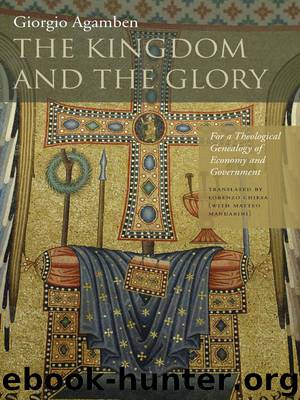The Kingdom and the Glory by Agamben Giorgio Mandarini Matteo Chiesa Lorenzo

Author:Agamben, Giorgio, Mandarini, Matteo, Chiesa, Lorenzo [Agamben, Giorgio, Mandarini, Matteo, Chiesa, Lorenzo]
Language: eng
Format: mobi, epub
Publisher: Stanford University Press
Published: 2011-11-10T22:00:00+00:00
Threshold
That angelology directly coincides with a theory of power, that the angel is the figure of the government of the world par excellence is already evident from the simple fact that the angelic names are identified with those of worldly powers: arkai, exousiai, kyriotētes (principatus, potestates, dominationes in the Latin translation). This is evident in Paul, in whose Letters it is not always easy to distinguish the names of the angels from those of the worldly authorities. After all, the hendiadys arkai kai exousiai is commonly used, in the Greek of that time, as a way of indicating human powers in a generic way (so in Luke 12:11, Jesus’s followers are dragged into the synagogue before “magistrates, and powers [epi ( . . . ) tas arkas kai tas exousias],” and in Titus 3:1, Paul counsels the members of the community to be “subject to arkais exousiais”). In the Letter to the Colossians as well, where the cult of angels is certainly in question, it is not clear whether the “principalities and powers” over which the Messiah has triumphed via the cross (Colossians 2:15) are angelic or human powers. And even in the celebrated verse of 1 Corinthians 15:24, the destruction of “all rule and all authority and power” that the Messiah brings about when he hands back the kingdom to God can refer equally well to worldly powers and to the angels. In other passages, in which the terms unequivocally denote angelic powers, these are seen as ambiguous demonic powers. So the Letter to the Ephesians, which opens with the luminous image of the resurrected Messiah whom God places on his right-hand side, “far above all principality, and power, and might, and dominion” (Ephesians 1:21), ends with the evocation of angels themselves as “the rulers of the darkness of this world” (kosmokratores tou skotou toutou): “For we wrestle not against flesh and blood, but against principalities, against powers, against the rulers of the darkness of this world, against spiritual wickedness in high places” (Ephesians 6:12).
The intercourse between the angels and the worldly powers is more intimate and essential, and derives, first, from the fact that, insofar as they are figures of the divine government of the world, they are immediately also the “princes of this world” (1 Corinthians 2:6). The worldly and angelic powers become indistinguishable in Paul because they both stem from God. The celebrated passage in Romans 13:1–5, on the divine origin of every exousia (“there is no power but of God”), should be read from this perspective, and in it one also finds its corrective. Pauline angelology is, in fact, in agreement with the critique of law and authority that it founds. For authority, like law (which “was ordained by angels”: Galatians 3:19; see also Hebrews 2:2), was given “for sin” (Romans 8:3), and its power ceases with the arrival of the Messiah. No “angel” nor any “power” (arkē) can separate us from “Christ Jesus our Lord” (Romans 8:38–39), because “we shall judge angels” as well (1 Corinthians 6:3).
Download
The Kingdom and the Glory by Agamben Giorgio Mandarini Matteo Chiesa Lorenzo.epub
This site does not store any files on its server. We only index and link to content provided by other sites. Please contact the content providers to delete copyright contents if any and email us, we'll remove relevant links or contents immediately.
The remains of the day by Kazuo Ishiguro(8999)
Tools of Titans by Timothy Ferriss(8396)
Giovanni's Room by James Baldwin(7346)
The Black Swan by Nassim Nicholas Taleb(7129)
Inner Engineering: A Yogi's Guide to Joy by Sadhguru(6796)
The Way of Zen by Alan W. Watts(6614)
The Power of Now: A Guide to Spiritual Enlightenment by Eckhart Tolle(5782)
Asking the Right Questions: A Guide to Critical Thinking by M. Neil Browne & Stuart M. Keeley(5775)
The Six Wives Of Henry VIII (WOMEN IN HISTORY) by Fraser Antonia(5515)
Astrophysics for People in a Hurry by Neil DeGrasse Tyson(5190)
Housekeeping by Marilynne Robinson(4448)
12 Rules for Life by Jordan B. Peterson(4305)
Ikigai by Héctor García & Francesc Miralles(4274)
Double Down (Diary of a Wimpy Kid Book 11) by Jeff Kinney(4272)
The Ethical Slut by Janet W. Hardy(4253)
Skin in the Game by Nassim Nicholas Taleb(4250)
The Art of Happiness by The Dalai Lama(4130)
Skin in the Game: Hidden Asymmetries in Daily Life by Nassim Nicholas Taleb(4007)
Walking by Henry David Thoreau(3962)
